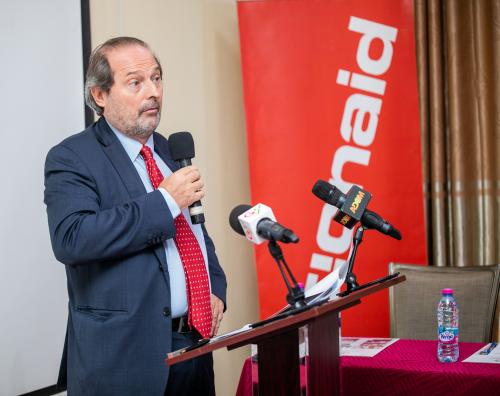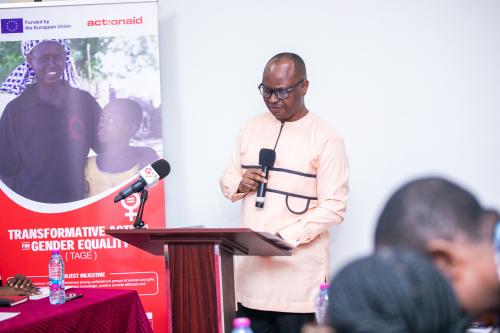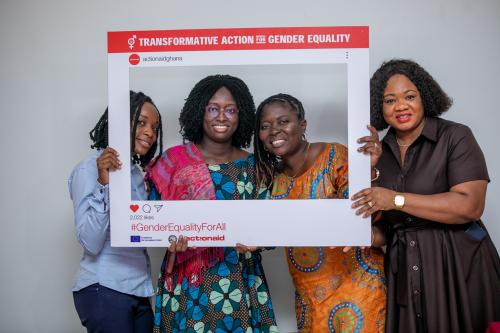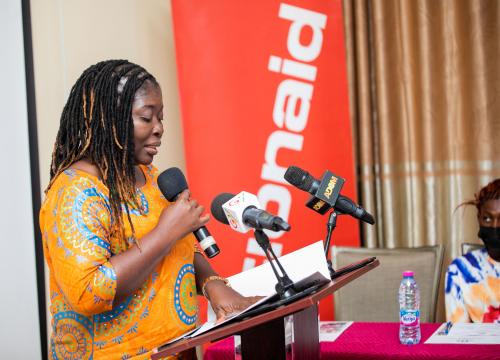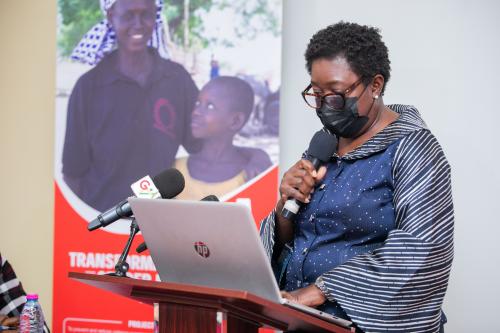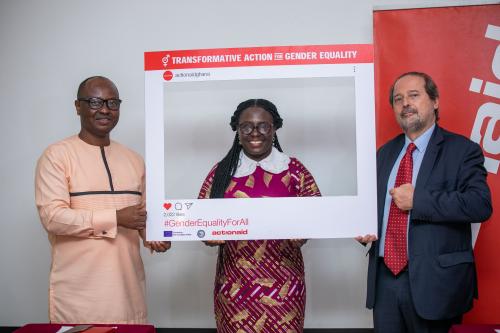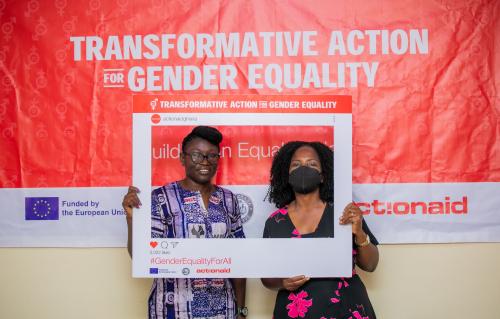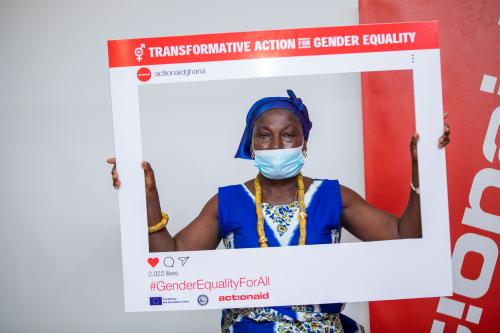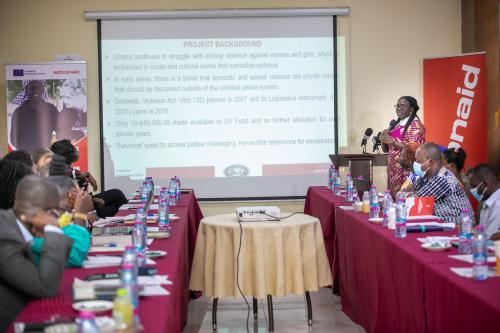EU funded Transformative Action for Gender Equality project launched
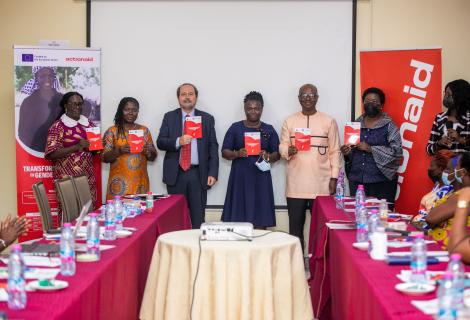
The project seeks to protect women from gender-based violence
ActionAid Ghana (AAG) in partnership with International Federation of Women Lawyers (FIDA) has secured funding from the European Union (EU) to roll out the Transformative Action for Gender Equality (TAGE) which seeks to empower women and girls to know their rights, understand and recognise all forms of domestic violence, seek protection and defend themselves, both within their communities and through the effective implementation of relevant laws, policies and legal mechanisms which provide protection against violence.
Speaking at the project launch in Accra on Tuesday July 5, 2022, Mr. John Nkaw, Country Director of ActionAid Ghana noted that “TAGE is a very critical step in the country’s battle to empower women, especially in marginalised parts of our society, eradicate the scourge of gender-based violence from our culture, and ultimately attain the imperatives of social justice, gender equality and poverty amelioration”.
Madam Susan Aryeetey, Acting Executive Director of FIDA Ghana said the Gender-based violence secretariate at the Ministry of Gender, Children and Social Protection is financially constraints and unable to undertake activities to aid the achievement of its objectives which include the construction of shelters for survivors of gender-based violence.
She said the budgetary allocation to the ministry is not substantial and needed to be increased to support the implementation of planned activities.
Mr. Raffaele Quarto, Trade Counsellor, European Delegation to Ghana in his address noted that the Transformative Action for Gender Equality Project falls under the EU’s five-year Gender Action Plan which calls for a strategic approach from the United Nation and its member states to accelerate progress towards gender equality.
He noted that the European Union is committed to supporting gender equality actions and looking forward to the successful implementation of the project.
Madam Florence Ayisi, Acting Director, Department of Children, Ministry of Gender, Children and Social Protection who delivered a keynote address on behalf of the Ministry’s Chief Director called on ActionAid and FIDA Ghana to furnish the ministry with progress report on the successes of the project adding, the report will enable the Ministry to include all achievements in national reports.
Pillars of TAGE Action
The Transformative Action for Gender Equality (TAGE) project falls under ActionAid’s Mission Priority two which focuses on addressing the root causes of violence against women and girls, reduce Unpaid Care work and promote decent work.
The roll-out of the action is underpinned by the recognition that violence against women and girls is held in place by patriarchal norms around masculinity and femininity and inequitable gender norms such as male entitlement to sex, notions, of female subservience and intra-household power dynamics. It focuses on both community and national level interventions to remove systemic social-cultural and institutional practices that perpetuate violence and discrimination against women and girls, building their agency to protect themselves and seek support, and stimulating stronger pro-active responses from state actors responsible for the implementation of legislative and policy provisions to tackle gender-based violence.
The attitudes of people, especially men, around violence and gender inequality are formed and shaped by wider social norms through their adolescent stage to adulthood, which generates attitudes and beliefs that reinforce and drive unjust power relationships leading to violence against women and girls.
To address the imbalances in gender equality and prevent abuses aimed at women and girls, interventions under the TAGE hinges on three interdependent pillars.
The first pillar looks at the implementation of interventions that empower excluded and vulnerable women and girls, to know their rights, build their agency and protect themselves. These will include training on violence reporting mechanisms provision of counseling services to women survivors of violence among others. The second pillar is centered on societal behavioural and attitudinal change and strengthening of community supportive and response structures and systems. Interventions under this pillar include awareness raisin among community gate keepers and traditional leaders, strengthening of Community Based Anti-Violence Teams (COMBAT) and Community Paralegals to prevent abuses against women.
The third pillar which focuses on holding state actors to account on their primary responsibility to protect women, girls, and other socially differentiated groups. Under this pillar, capacity building exercises will be organized for DoVVSU officers to improve their interaction with persons with speech impairment to document their reports of threats and incidence of violence and follow-up with effective responses.
Implementation Approach
The TAGE project is being implemented under ActionAid Ghana’s Human Rights-Based Approach which is centered on empowerment, solidarity and campaigning through awareness raising and training on rights, gender equality and advocacy to empower women and girls. It builds solidarity through community-wide activities to respect women’s rights as well as bringing women and youth groups, networks and media together for collective action to change harmful norms, traditions and beliefs that underpin gender-based violence. Additionally, the project will build alliance with women rights networks and organisations to campaign and hold government to account on preventing violence against women and girls and full implementation of the Domestic Violence Act 2007 (732).
The project also adopts the Gender equality and feminist leadership approach which focuses on promoting the rights and well-being of girls and women. Over 500 women leaders in 64 communities will be selected and trained on domestic violence prevention and reporting and principles of feminist leadership. The selected women will also be supported to provide step-down knowledge and skills to members of their respective groups.
The action which will be implemented within a 30-month period, also seeks to prevent and reduce violence experienced among underserved groups of women and girls in the selected districts through enhanced knowledge, positive societal attitudes, and responsiveness of state actors.
Being implemented in Binduri, Pusiga Naumba North and Sagnarigu, Ga South and West, Ho and Adaklu districts in the Upper East, Northern, Greater Accra and Volta regions respectively, the action is expected to reach an estimated 2.8 million women, girls, especially those with disabilities, widow and informal workers. The other targets are young people, men, media organisations, women rights networks, government agencies, traditional authorities, and faith-based leaders through a catalytic national social norms campaign.
Prevalence of Gender-Based Violence in Ghana
Gender-based violence generally remains pervasive in Ghana. Although a comparison between the 2008 Ghana Demographic and Health Survey (GDHS) and the 2015 Ghana Family Life and Health Survey (GFLHS) showed that the incidence of physical violence experienced by women decreased from 17.2% in 2008 to 10.3% in 2015, the evidence still indicates an overall high prevalence of violence against women and girls.
A 2019 research by the Institute of Statistical Social and Economic Research indicated that over 43% of women and girls reveled they had experienced at least one form of Intimate Partner Violence (IPV) within the last 12 months. These levels of violence are sustained by embedded social and cultural norms which normalise violence and belief (especially in the rural districts) that treat domestic and sexual violence as private matters that should be discussed outside the parameters of the criminal justice system.
Evidence also indicates that women themselves accept and endorse wife-beating, again, more prevalent in rural areas. An average of 28% of women in Ghana think wife-beating may be justified for a variety of reasons and a survey by the Ghana Statistical Service revealed that 11.4% of rural women endorse wife-beating as compared to 5% of women in the urban areas. A shocking 42.7% of women in Northern region believe a man can hit his wife if she disobeys him.
The COVID-19 pandemic has also increased the burden on households by interrupting sources of income and heightening tension leading to increased domestic violence, as shown by anecdotal evidence and frequent media reports of violence against women and girls - resulting in deaths, particularly in the Greater Accra region. People with disabilities are marginalised and excluded from decision-making, doubly so for women and girls.
The districts selected for the action have records of high rate of domestic violence. Sagnarigu, Pusiga, and Nanumba North are largely rural with an agricultural base, Ga South and Ga West are peri-urban districts and Ho is largely an urban district. Evidence from the Domestic Violence and Victims Support Unit (DoVVSU) of the Ghana Police Service and Social Welfare from all the districts indicate a high rate of domestic violence (28%), child marriage (15%) and Female Genital Mutilation (25% - Pusiga district).
Other gender inequality issues include bias for boys’ education, lack of inclusion of women and girls in decision-making processes, a disproportionately huge care burden on women and girls, lack of access to land and other resources. These rights violations concerns are very true for the rural and peri-urban districts in particular. Also, practices such as widowhood rites in Binduri and Pusiga in Upper East and Volta regions subject women to psychological and physical violence to cleanse and absolve them of blame for the death of their partners, akin to the backward witchcraft allegations constantly levelled against older women in Northern region leading to their banishment to camps.
Project response to International Programme and Cross-cutting Issues
The project fits within the global United Nations 2030 Agenda for Sustainable Development which was adopted by all United Nations Member States as a universal call to action to end poverty, protect the planet and ensure that all people enjoy peace and prosperity. It also fits into the European Consensus on Development (2017) which commits to promote the protection and fulfillment of women and girls’ rights.
The TAGE project will contribute to the global objective by supporting the commitments set in the Ghana National Gender Policy, a document that provides direction to achieve Ghana’s human rights and gender equality targets. It also fulfils its overall objective of promoting human rights and ensuring gender equality are not only desirable goals, but the cornerstone for every successful and sustainable development. It highlights women’s rights and applies intersectional lens and vulnerability analysis to focus on women and girls with disabilities.
